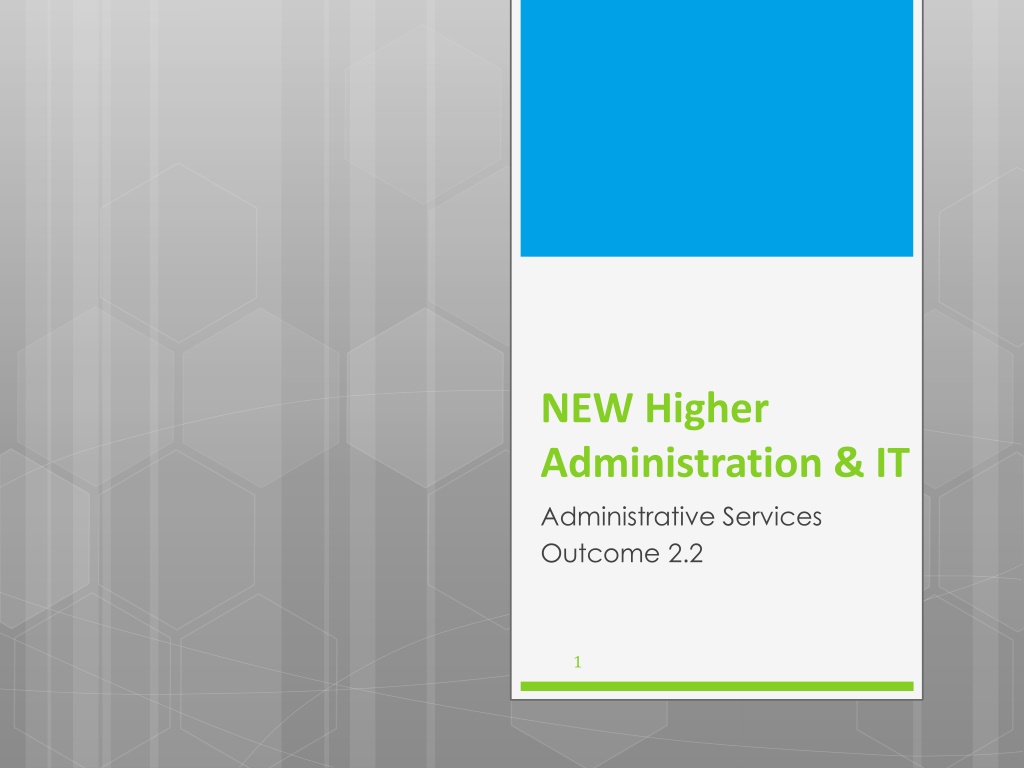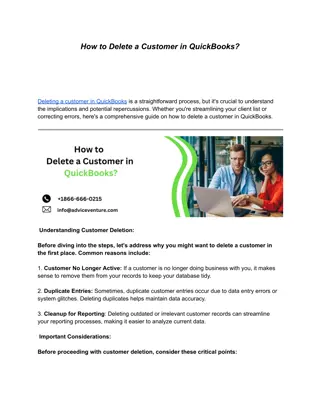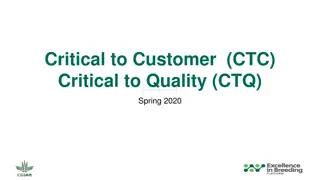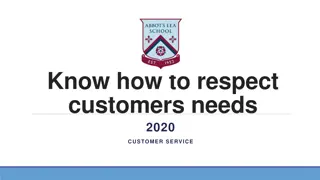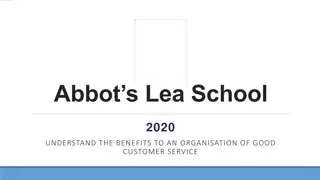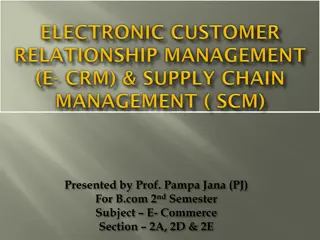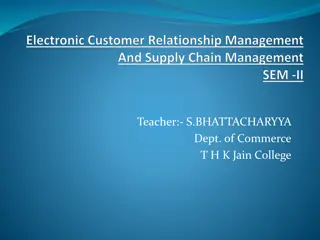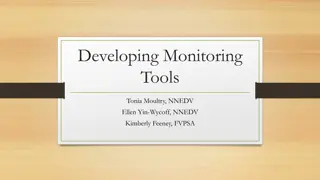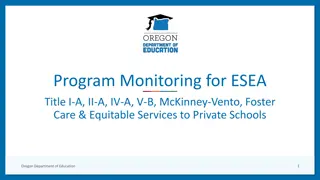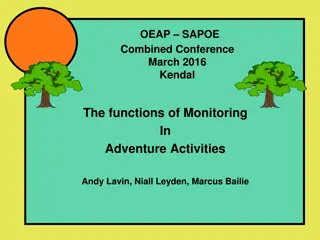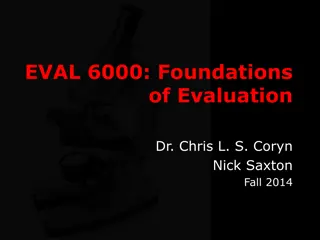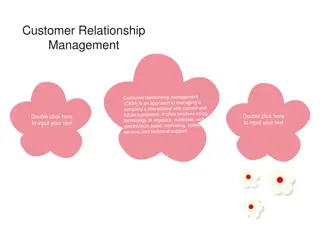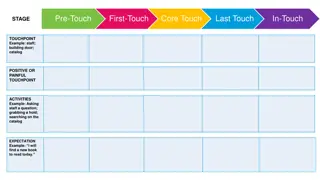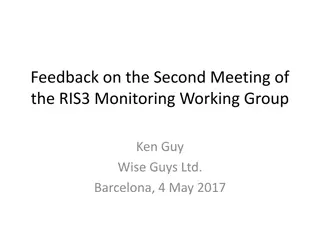Enhancing Customer Care Strategies: Monitoring, Evaluation, and Improvement
Discover strategies for monitoring and evaluating the quality of customer care, evaluating policies, conducting market research, addressing customer issues, gathering customer feedback through satisfaction questionnaires, and utilizing mystery shopping to improve overall customer experience.
Download Presentation

Please find below an Image/Link to download the presentation.
The content on the website is provided AS IS for your information and personal use only. It may not be sold, licensed, or shared on other websites without obtaining consent from the author. Download presentation by click this link. If you encounter any issues during the download, it is possible that the publisher has removed the file from their server.
E N D
Presentation Transcript
NEW Higher Administration & IT Administrative Services Outcome 2.2 1
2 Outcome 2.2 Describing the mechanism for monitoring and evaluating the quality of customer care.
3 Evaluating Policy If the customer care policy is evaluated it allows the organisation to: Monitor where complaints come from and what they are about Target where training or changes in procedures need to be introduced Assure customers of prompt attention at all times Show commitment to customers, encouraging their loyalty and gaining their trust and respect
4 Market Research Field Research new information is gathered for the business. Eg customer focus group, mystery shopper Desk Research Information which already exists eg government statistics, competitor profiles, financial reports
5 Eliminating Customer Issues Organisations who show a willingness to find and eliminate customer problems achieve customer focus. How to improve: Listen to what the customer has to say Conduct focus groups Customer satisfaction survey Best customer service awards Provide customer service training Internal newsletter sharing good practice Provide warranties, guarantees and refunds
6 Customer Satisfaction Questionnaires often need an incentive like entry into a prize draw Comment cards not always taken seriously eg after a meal in a restaurant Telephone customers resent being interrupted at home, but often used as a courtesy call after eg home improvements to see if there are any problems (being pro- active) Interview time consuming and expensive, unpleasant if people are rude Online surveys often questions not read properly, often follows an online purchase
7 Mystery Shopper This is a person who pretends to shop and experience the service and care ordinary customers receive. Staff are not aware the mystery shopper is not known to the team being evaluated the hope to give a true reflection of what a real customer is experiencing. The mystery shopper will complete a survey and return it for the organisation to take on board feedback given this can be positive or negative.
8 What might be Mystery Shopped? Assessing Customer Service eg speed, communication Assessing customer experience in store eg cleanliness; product displays etc Assessing any hostility from company employees Are customer needs being met? Are policies being followed? Sample employee s product knowledge
9 Customer Focus Groups (1) Small groups of customers brought together to provide the organisation with feedback on their goods and services, proposed new products and lines that are no longer profitable. A range of viewpoints providing in-depth discussion. Feedback is immediate. Clarification can be sought from participants further explanations Sometimes a marketing organisation will carry out the research so the participants may not know which company they are reporting on.
10 Customer Focus Groups (2) Expensive to run minimum would be travel expenses for participants. Information is only a sample of what all customers think at a certain point in time. For a national perspective, focus groups would need to be held throughout the country time consuming exercise.
11 Dealing with Customers Face to Face Can identify uncertainties and clarify immediately Allows for subtle questioning Demonstrations can be given Body language can be read May help to defuse the situation (personal contact) Up-selling may increase sales
12 Image result for postal survey Postal Survey Advantages A large number of customers can be surveyed Disadvantages Response rate is low Can be expensive to post all surveys Customers can take time to fill in the form, may result in more honest feedback May need to provide a prize draw to encourage responses
13 Image result for telephone survey Telephone Survey Advantages Large number surveyed particularly if at the end of a telephone call via an automated system Disadvantages Customers don t like being disturbed at home (hence end of call surveys are growing in popularilty) Can be recorded for reference
14 Call Centres Outsourcing to foreign call centres (eg India) may anger and frustrate some customers if a complaint is not being treated seriously. PlusNet (ISP) advertises a Yorkshire based call centre In general this is a cost effective method of dealing with customers. However, they can get easily confused if a large number of automated call menu options are presented
15 Complaints in Writing This creates a permanent record, replies can be kept for future reference (especially if the customer contacts again). Email is becoming more important, however this has the drawback that a customer might expect an immediate response.
16 Loyalty Schemes Examples: Boots, Tesco, Nectar (Sainsbury) The customer earns points for spending in the store (may also be online) These points are spent against other goods/services Stores gain valuable market research information from the data collected. Used to gather spending habits of customers in order to alter prices and extend special offers. Customer feels valued and information gained win win!
17 Image result for tripadvisor Review Sites Customers can rate the company on a sliding scale eg 4/5; but also provide a more detailed comment. The business can provide a follow-up comment itself. Shows that the company cares about customer care if done open and transparently. There is no hiding from any issues which will be swiftly resolved.
18 E-commerce (Customer Service) A well-designed, easy to use and up-to- date website will encourage customers. Available 24/7 and as more people gain confidence in using the Internet this will save the organisation costs in terms of staff, storage and advertising.
19 The Social Media Angle Most organisations now have several social media accounts. This is another method of 2-way dialogue. Large organisations will have a dedicated social media team. If messages are not dealt with appropriately there could be negative publicity. It is difficult to meet 24/7 expectations of customers. What's it like to answer angry tweets about trains? http://www.bbc.co.uk/news/magazine-34442302
20 The Social Media Angle Some more social media drawbacks Everybody can see the complaint as it is in the public domain damaged reputation? Lack of privacy for sensitive issues? Volume of tweets may mean a missed complaint must use software to manage the process A dedicated member of staff (or team) is an additional expense Its not possible to see facial expressions or hear the tone of voice misinterpretation of the communication? There may be a breach of legislation if the employee does not respond appropriately or have the right training Restriction in characters often requires additional communication method eg telephone to resolve complex matters,
How To Pass Higher Administration & IT 21 Sample Exam Questions Describe two methods of gathering customer feedback. (4) Compare electronic methods of gathering customer feedback to more traditional face-to-face or paper-based systems. (2)
22 Actual Examination Questions
NEW Higher Administration & IT Administrative Services Outcome 2.2 23
